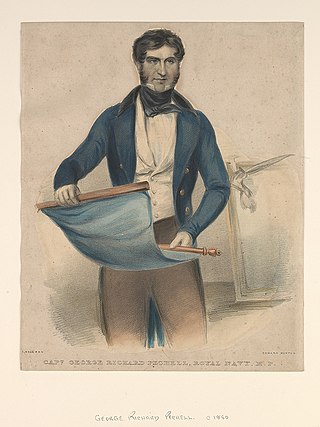This article contains information about the literary events and publications of 1822.

The Shelley Memorial is a memorial to the English poet Percy Bysshe Shelley (1792–1822) at University College, Oxford, England, the college that he briefly attended and from which he was expelled for writing the 1811 pamphlet "The Necessity of Atheism".

The Villa Diodati is a mansion in the village of Cologny near Lake Geneva in Switzerland, notable because Lord Byron rented it and stayed there with Dr. John Polidori in the summer of 1816. Mary Shelley, Percy Bysshe Shelley, and Mary’s stepsister Claire Clairmont, who had rented a house nearby, were frequent visitors. Because of poor weather, in June 1816 the group famously spent three days together inside the house creating stories to tell each other, two of which were developed into landmark works of the Gothic horror genre: Frankenstein by Mary Shelley and The Vampyre, the first modern vampire story, by Polidori.

Great Russell Street is a street in Bloomsbury, London, best known for being the location of the British Museum. It runs between Tottenham Court Road in the west, and Southampton Row in the east. It is one-way only (eastbound) between its western origin at Tottenham Court Road and Bloomsbury Street.
Nationality words link to articles with information on the nation's poetry or literature.

Warnham is a village and civil parish in the Horsham district of West Sussex, England. The village is centred 2 miles (3.2 km) north-northwest of Horsham, 31 miles (50 km) from London, to the west of the A24 road. Other named settlements within the parish include the hamlets of Goosegreen, Kingsfold and Winterfold as well as parts of Strood Green and Rowhook. The area is in the northwest of the Weald, a gently sloped remnant forest in southeast England and largely a plain by erosion.

Castle Goring is a Grade I listed country house in Worthing, in West Sussex, England about 4.5 miles northwest of the town centre.
There have been three baronetcies created for members of the Shelley family, one in the Baronetage of England and two in the Baronetage of the United Kingdom. The three recipients of the titles represented two different branches of the family with a common ancestor in John Shelley of Michelgrove. The most famous member of the family is the poet Percy Bysshe Shelley, although he never held any title. The holders of the third and last creation were later elevated to the peerage as Baron De L'Isle and Dudley and Viscount De L'Isle.
Nationality words link to articles with information on the nation's poetry or literature.
Sir Bysshe Shelley, 1st Baronet was the grandfather of English Romantic poet Percy Bysshe Shelley.

Horsham Museum is a museum at Horsham, West Sussex, in South East England. It was founded in August 1893 by volunteers of the Free Christian Church and became part of Horsham District Council in 1974. It is a fully accredited museum and serves both Horsham and its district with the support of the Friends of Horsham Museum and an active volunteer base.

Sir Timothy Shelley, 2nd Baronet, was an English politician and lawyer. He was the son of Sir Bysshe Shelley, 1st Baronet, and the father of Romantic poet and dramatist Percy Bysshe Shelley.

Sir Percy Florence Shelley, 3rd Baronet, was the son of the English poet Percy Bysshe Shelley and his second wife, Mary Wollstonecraft Shelley, novelist and author of Frankenstein. He was the only child of Mary Wollstonecraft Shelley to live beyond infancy. His middle name, possibly suggested by his father's friend Sophia Stacey, came from the city of his birth, Florence in Italy. He had two elder half-siblings, by his father's first marriage to Harriet Westbrook, and three full siblings who died in infancy.

Percy Bysshe Shelley was a British writer who is considered one of the major English Romantic poets. A radical in his poetry as well as in his political and social views, Shelley did not achieve fame during his lifetime, but recognition of his achievements in poetry grew steadily following his death, and he became an important influence on subsequent generations of poets, including Robert Browning, Algernon Charles Swinburne, Thomas Hardy, and W. B. Yeats. American literary critic Harold Bloom describes him as "a superb craftsman, a lyric poet without rival, and surely one of the most advanced sceptical intellects ever to write a poem."

Mary Wollstonecraft Shelley was an English novelist who wrote the Gothic novel Frankenstein; or, The Modern Prometheus (1818), which is considered an early example of science fiction. She also edited and promoted the works of her husband, the Romantic poet and philosopher Percy Bysshe Shelley. Her father was the political philosopher William Godwin and her mother was the philosopher and women's rights advocate Mary Wollstonecraft.

Vice-Admiral Sir George Richard Brooke-Pechell, 4th Baronet, born George Richard Pechell, was a British Royal Navy officer and Whig politician. He was a Member of Parliament (MP) for Brighton for 25 years.
Shelley's Cottage is a Grade II listed early 19th-century large cottage in west Englefield Green, Surrey, England within 100 metres of Windsor Great Park marking the start of Berkshire.

Greta Hall is a house in Keswick in the Lake District of England. It is best known as the home of the poets Samuel Taylor Coleridge and Robert Southey.

The Upper Flask was a tavern near the top of Hampstead hill in the 18th century which sold flasks of water from the spa at Hampstead Wells. It was located in Heath Street. It was the summer meeting place of the great literary and political figures of the Kit-Kat Club such as Walpole. The tavern business ceased in the 1750s and the grand house subsequently became the private residence of ladies and gentlemen such as Lady Charlotte Rich, George Steevens and Thomas Sheppard.

Bysshe is a surname sometimes used as a given name. It has been said that it is a variation of the surname Bush.













